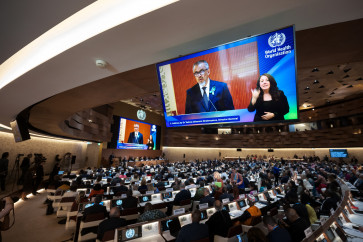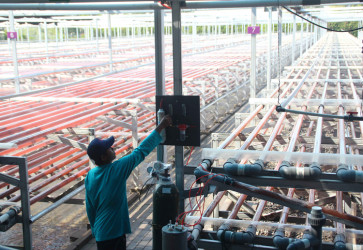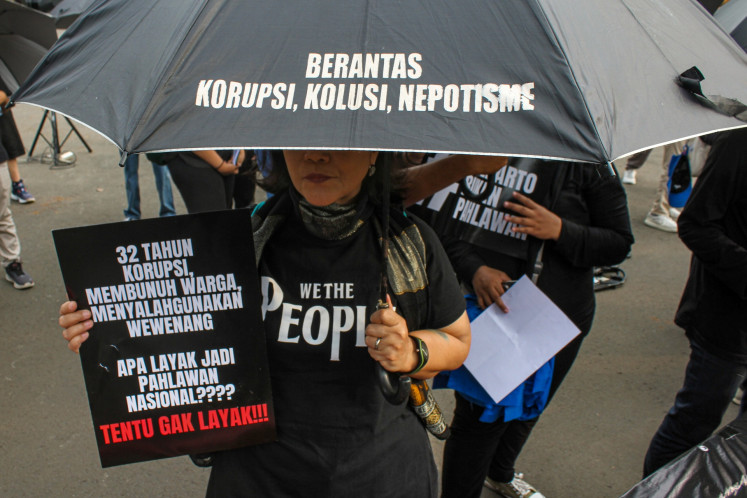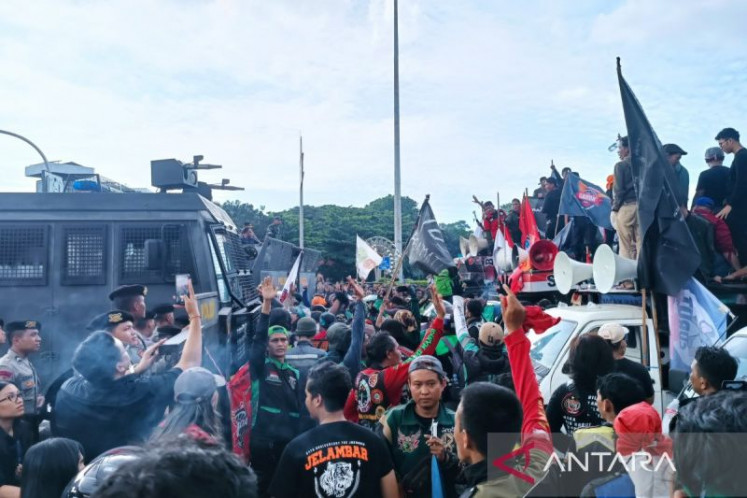Reform team's suggestions cover age-old problems
The reform team for oil and gas governance recently ended its six-month assessment of the complex issues that handicap the sector, offering a handful of recommendations that are supposed to solve problems that have been plaguing the industry for decades and also tackle the so-called oil and gas mafia
Change text size
Gift Premium Articles
to Anyone

T
he reform team for oil and gas governance recently ended its six-month assessment of the complex issues that handicap the sector, offering a handful of recommendations that are supposed to solve problems that have been plaguing the industry for decades and also tackle the so-called oil and gas mafia.
Although the team, which consists of 13 people ranging from academics to practitioners, could not point out exactly who is a part of the mafia, it expects the recommendations to establish stronger institutionalization of the oil and gas sector, said Faisal Basri, the team head.
The team ' formed by the Energy and Mineral Resources Minister last November amid increasing worries about the ways in which the mafia was taking advantage of the sector's poor management and supervision ' handed in the 72-page-report to the minister last week.
Recommendations were laid out in 12 points addressing widely discussed issues, such as the necessity of transparency, progress toward energy independence, infrastructure projects and improvements to upstream oil and gas management.
'We are trying to solve the main problems in accordance with our abilities. We are giving recipes on how to avoid the oil and gas mafia. We established the main idea and hope our recommendations will be followed up on, since we don't have the authority to do so,' Faisal said.
Among the main issues the team brought up was the future existence and the proper form of the oil and gas regulatory body, a function currently filled by Upstream Oil and Gas Regulatory Special Task Force (SKKMigas).
The team suggested that the government replace the current management structure under SKKMigas with a new state-owned enterprise (SOE) that would have the authority to sign contracts with private oil and gas companies to manage the country's fields and blocks. The reform team also advised the government to implement a service contract system for the sector to replace the current production sharing contract (PSC) system.
The ministry has already addressed some of these issues by proposing in the draft of the new oil and gas law that a specially assigned SOE would take over SKKMigas' role and that there would be royalties and taxes on the oil and gas contracts.
In its list of recommendations the reform team also mentioned revamping old refineries, using private firms' facilities to boost the national fuel stock capacity and implementing an open-access policy particularly for the gas pipeline.
Pertamina is spending US$18 billion to revamp its four refineries and is assessing the usage of fuel storage tanks with SOEs and private firms.
Concerning the management of the procurement of crude oil and petroleum products, the team reiterated the need for Pertamina to improve the efficiency and transparency of its Integrated Supply Chain (ISC) unit while securing its supply.
The ISC has just been appointed to take over the procurement sector from the recently dismissed Petral, Pertamina's subsidiary.
'However, a forensic audit must be done on Petral from January 2014 to June 2015,' the report said.
The report also discussed the need to establish better calculation mechanisms for setting fuel prices.
Energy and Mineral Resources Minister Sudirman Said mentioned that most of the team's recommendations were in line with the ministry's current plans for improving the sector.
'There are new items and there are recommendations that we have already acted on. About 60 percent of the recommendations are already in our pipeline and we are moving forward,' he added.
___________________________________________
Recommendations from the Reform Team for Oil and Gas Governance
1. General recommendations:
i. Provide transparent and accountable system in oil and gas trade to improve efficiency in midstream and downstream sectors
ii. Encourage domestic oil companies to explore within country by providing more accurate information and data along with incentives
iii. Open opportunities for equity ownership or overseas oil and gas blocks in a bid to secure domestic oil and gas supply
iv. Encourage energy independence by:
a. Developing new and renewable energy
b. Prioritizing development of hydroelectric and geothermal power plants
c. Using biofuel as transport fuel
d. Developing solar energy
2. Management of state revenue from oil and gas sector:
i. Save a certain percentage of state revenue from oil and gas:
a. In the interest of future generations
b. To finance of new and renewable energy development
c. To finance safety net policy that will reduce impact of oil price fluctuations
d. To finance research on enhanced oil recovery
e. To finance general and seismic survey
3. Oil and gas upstream governance:
i. Remove Pertamina's regulatory and control functions on oil and gas upstream sector, such that Pertamina can focus on commercial business by avoiding risk of oil and gas contracts
ii. Establish special state-owned company to take over Pertamina's regulatory and control function in the upstream sector
4. Fiscal system for oil and gas upstream sector:
i. Open opportunities for applying new fiscal systems
a. Apply cooperation contract models that are modest, transparent, flexible and competitive
b. Service contract model could be used for working area with high reserve and low level of difficulty
ii. Restructure cost recovery regulation. Government or appointed institution could arrange data base of cost component along with price standard of each component
5. Extension of oil and gas contracts:
i. Encourage Pertamina to take over enterprises in oil and gas working area whose contract period is expired to support production continuity
ii. Ensure full use of participating interest by regions through provincially owned enterprises (BUMD)
6. Permits and investment:
i. Evaluate double and irrelevant permits, including those issued by regional governments, and simplify Investment Coordinating Board (BKPM)'s one stop services
ii. Eliminate rules affecting high-cost economy practices in oil and gas sector
a. Imposition of 3 percent tax on crude oil sale by domestic traders
b. Enforcement of cabotage principle on boats servicing oil and gas upstream businesses and the simplification of usage license
iii. Incentivize development of domestic private oil refineries
7. Infrastructure:
i. Provide domestic enterprises with government support and incentives for development, distribution infrastructure and gas storage
ii. Avoid stand-alone refineries so that old refinery revamping and new refinery development could improve capacity and structure of domestic industry
iii. Efficiently and consistently apply an open access policy on fuel depots, refineries, transporters and oil and gas distribution
8. Regional rights:
i. Transparently take first tranche petroleum and balance of regional financial center for region's rights
ii. Firmly regulate exploitation of regional potentials
9. Alignment with domestic industry and business:
i. Give more opportunities to Pertamina and domestic companies to get exploration rights in working areas with low levels of difficulty
ii. Foreign oil contractors required to include Pertamina and/or other domestic companies in working area exploration with high levels of difficulty
10. Trade and procurement of crude oil and fuel:
i. Stop importing RON 88 and Gasoil 0.35 percent sulfur
a. Replace with imported Mogas 92 and Gasoil 0.25 percent sulfur
b. Switch production of fuel RON 88 with RON 92 in domestic refineries
ii. Rearrange all processes and authority of crude oil and fuel sales and procurement
a. Crude oil and fuel sales tender and imports procurement to be managed by Pertamina ISC by ensuring transparency and accountability
b. Strengthen ISC and replace old management to tackle oil and gas mafia
c. Conduct audits, especially on the procurement by Pertamina Energy Services (PES) from January 2014 to June 2015
11. Domestic fuel pricing
i. Set retail price on certain, stable calculation, open to the public
a. Formulation of 'alpha' amount
b. Safety net policy: subsidy at times when prices are high and higher market prices when prices are low
c. Calculate subsidy based on fuel volume distributed to last transfer point for gas stations and fuel depots for trains
12. Other issues:
i. Clearly and transparently divide roles and responsibilities between government agencies, and between central and local government
ii. Maximize results of units under Energy and Mineral Resources Ministry (ESDM)
iii.Encourage growth of production and use of gas within the country through:
a. Gas pricing policy reforms
b. Competitive profit sharing level
c. Imposition of gas pooling price policy
d. Gas midstream sector restructuring and reform
e. Regulation of tolling structure
f. Road map on gas infrastructure development
JP/agn - Source: Reform Team for Oil and Gas Governance









